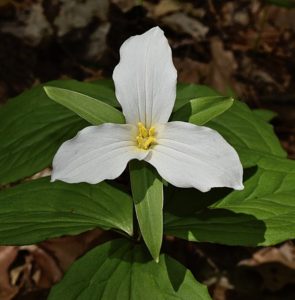 Last night after dinner, our family took a drive up into the mountains. We parked along a creek and hiked a small trail that meandered along the tumbling water as it flowed joyfully down the narrow ravine. As we walked along, we saw large groups of Trilliums that had grown up out of the freshly melted snow. These large, white, three petaled flowers are a welcome sight in the Spring! It is a sure sign that Spring is well on its way! However, these beautiful flowers have an incredibly short lifespan. Within a matter of days, their vibrant white turns to a deep purple and then to a pale brown before dropping lifelessly off the stem of the plant. The plants boldly declare Spring is here and then they disappear into the ground.
Last night after dinner, our family took a drive up into the mountains. We parked along a creek and hiked a small trail that meandered along the tumbling water as it flowed joyfully down the narrow ravine. As we walked along, we saw large groups of Trilliums that had grown up out of the freshly melted snow. These large, white, three petaled flowers are a welcome sight in the Spring! It is a sure sign that Spring is well on its way! However, these beautiful flowers have an incredibly short lifespan. Within a matter of days, their vibrant white turns to a deep purple and then to a pale brown before dropping lifelessly off the stem of the plant. The plants boldly declare Spring is here and then they disappear into the ground.
We shouldn’t miss that Scripture often refers to humanity as the grass or flowers in a field, here one day and gone the next. Scripture reminds us that we come from dust and quickly return to dust. There is a reason why the phrase “Dust to dust” has long been attached to funerals. I have been especially reminded of these things in the past few weeks. Our weakness and frailty has been readily exposed. We can be taken out by a virus we can’t even see and an entire country can be nearly shut down by a microscopic organism. Regardless of where one stands in regard to the government’s response to the virus, we should not miss that nearly 18,000 Americans have died in the last couple weeks. If we value human life, that is a significant number in a very short amount of time. It stands as a poignant reminder of our frailty.
But here is the question: Does our frailty make us worthless? Are we no more important than the Trillium that announces Spring and then quickly dies? The Bible gives us a firm answer to this question. In Psalm 103, we read these words. “As a father pities his children, so the Lord pities those who fear Him. For He knows our frame; He remembers that we are dust. As for man, his days are like grass; as a flower of the field, so he flourishes. For the wind passes over it, and it is gone, and its place remembers it no more. But the mercy of the Lord is from everlasting to everlasting on those who fear Him, and His righteousness to children’s children, to such as keep His covenant, and to those who remember His commandments to do them.” (Psalm 103:13-18).
How does God pity us and extend His mercy and His righteousness to us? Well, earlier in the Psalm we read, “For as the heavens are high above the earth, so great is His mercy toward those who fear Him; as far as the east is from the west, so far has He removed our transgressions from us.” (Psalm 103:11-12). How has God done this? Through the Cross of Christ.
Today is known as Good Friday. It is the day in which we remember that Christ went to the Cross for us. He took God’s righteous wrath for our sins in our place. Jesus was our representative before the Holy God. He took the penalty of death that should be ours to take. Because He died on the Cross for us, our sins are forgiven through faith in Him. He has removed our transgressions from us, as far as the east is from the west and clothed us with righteousness.
The Bible reminds us we are frail, though we are often slow to believe it. But the Bible also tells us that we are precious and valuable. While our frailty is compared to dust, grass, and flowers, our value is compared to children. We are so precious to God that He sent His Son to die on the Cross for us. We are so precious to Christ that He went to the Cross with joy because He knew it would mean we would be with Him for eternity (See John 17:20-26; Hebrews 12:1-2). So, this Easter, as we are reminded of our frailty, may we be all the more thankful that we are precious to God! His mercy towards us is from everlasting to everlasting! You are precious to God!
